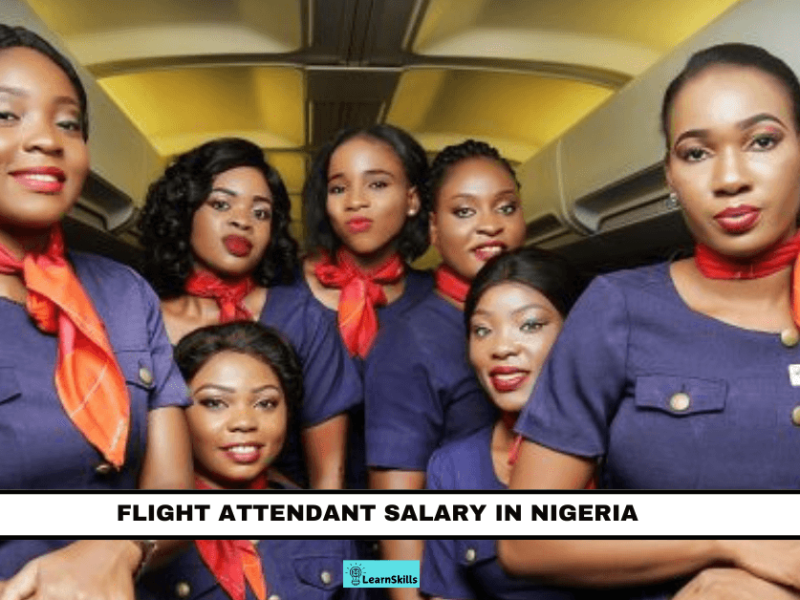When considering a career as a flight attendant in Nigeria, it’s essential to know what to expect regarding salary.
The highest pay for a flight attendant in Lagos is around NGN797,885 per month, with an average base salary of NGN200,000. This figure can vary based on the airline, your experience, and other factors.
As you explore this profession, you’ll learn that entry-level flight attendants typically earn between NGN92,000 and NGN180,000 per month. With more experience, your salary can increase, potentially reaching higher as you progress in your career.
Understanding these salary ranges can help you set realistic expectations and make informed decisions about your future.
Overview of the Flight Attendant Profession in Nigeria
The flight attendant profession is vital in the aviation industry, focusing on safety and customer service. Understanding the responsibilities and significance of cabin crew in Nigeria gives you insight into this career.
Roles and Responsibilities
As a flight attendant, your main duties involve ensuring passenger safety and comfort during flights. You are responsible for conducting safety briefings, demonstrating emergency procedures, and handling in-flight services such as meal distribution.
In addition, you support passengers with special needs and address their concerns. This may include helping families with young children or assisting elderly passengers.
Effective communication and teamwork are essential. You work closely with pilots and crew members to create a smooth flying experience. Adapting to challenges, such as dealing with difficult situations, is also part of the job.
Importance in the Aviation Industry
Flight attendants are crucial to the success of airlines in Nigeria. They are often the face of the airline, representing its brand and values. A well-trained cabin crew can enhance customer satisfaction and encourage repeat business.
Their role extends beyond just service; flight attendants ensure compliance with aviation regulations. You help maintain safety standards and contribute to the security of the flight.
In Nigeria, where the aviation industry is growing, the role of flight attendants is increasingly recognized. With more airlines entering the market, the demand for skilled cabin crew is increasing, bringing new opportunities for you in this profession.
Flight Attendant Salary Structure in Nigeria
The salary for flight attendants in Nigeria varies based on experience and location. You can expect different earnings whether you are just starting or have several years in the industry. It’s also helpful to compare these salaries with those in other countries to get a clearer picture.
Entry-Level vs. Experienced Salaries
The average entry-level salary for flight attendants in Nigeria is ₦116,000 monthly, especially in Lagos. This amount can vary depending on the airline.
As you gain experience, your salary can increase significantly. Experienced flight attendants can earn an estimated ₦797,885 monthly. This figure can include additional benefits like flight allowances and bonuses.
Salary Range Summary:
| Experience Level | Average Monthly Salary |
|---|---|
| Entry-Level | ₦116,000 |
| Experienced | ₦797,885 |
Comparison to Other Countries
When comparing flight attendant salaries in Nigeria to other countries, the differences can be notable. For instance, in the United States, flight attendants earn an average of $32.20 per hour, translating to higher monthly earnings.
In Europe, salaries also tend to be higher, reflecting the cost of living. Therefore, while entry-level salaries look attractive in Nigeria, they may not match international standards.
Nigerian salaries may improve as the industry grows, but they currently reflect local economic conditions and airline budgets.
Recruitment and Training for Flight Attendants
Becoming a flight attendant involves meeting specific educational and skill requirements. You need to complete rigorous training programs that prepare you for the role. Both recruitment and training focus on key abilities and qualifications.
Educational and Skill Requirements
To become a flight attendant in Nigeria, you typically need at least a high school diploma. Many airlines prefer applicants with a degree in fields like hospitality or tourism.
Key Skills Needed:
- Interpersonal Skills: Strong communication and customer service skills are vital. You will interact with passengers daily.
- Spoken English: Good command of spoken English is essential, as you must communicate with diverse passengers and crew.
- Fitness and Health: Airlines often require a medical evaluation to ensure you can meet physical demands, like moving luggage and responding to emergencies.
Having a pleasant demeanor and the ability to work in stressful situations also enhances your chances of being hired.
Training Programs and Certifications
There are specific training programs to undertake after recruitment. These usually last between 4 to 8 weeks, depending on the airline. Training often covers safety protocols, emergency procedures, and customer service.
Certifications may include:
- First Aid and CPR: You’ll learn how to handle emergencies and provide basic medical assistance.
- Safety Procedures: This includes safety demonstrations and emergency evacuations.
- Service Skills: You will also receive training in food service and passenger assistance.
Some airlines now include online training components, which make it easier to complete your coursework while balancing other commitments.
Airlines Hiring in Nigeria and Job Market Trends
The airline industry in Nigeria is experiencing growth, leading to new job opportunities for flight attendants. Major airlines are actively recruiting, and job market trends indicate a dynamic landscape with various recruitment events.
Major Airlines and Recruitment Events
Several major airlines are hiring in Nigeria, such as Emirates and Qatar Airways. These airlines frequently hold recruitment events to attract new talent. It’s beneficial for you to keep an eye on their official websites and social media pages for announcements.
Local Nigerian airlines are also expanding, providing new job openings. Participating in these recruitment events gives you a chance to meet airline representatives and learn more about their hiring criteria.
Networking with current employees can also provide insights into the application process and what to expect during interviews.
Evolving Job Market Dynamics
The job market for flight attendants in Nigeria is changing. There is a growing demand for skilled personnel due to the rising number of flights and increased passenger traffic.
Airlines are looking for candidates with strong customer service skills, adaptability, and cultural awareness. Your ability to communicate in multiple languages can be a significant advantage.
Training programs are becoming more accessible, enhancing candidates’ qualifications. Many educational institutions now offer courses in aviation and hospitality, better preparing you for this competitive field.
Benefits and Challenges of Being a Flight Attendant in Nigeria
Being a flight attendant in Nigeria offers unique benefits, especially related to travel and accommodation. There are also challenges concerning work-life balance and health considerations that you need to be aware of.
Travel Benefits and Accommodation
As a flight attendant, you enjoy significant travel benefits. You often receive free or discounted flights, allowing you to explore new destinations. This opportunity often extends to your family and friends.
Accommodation can also be part of your benefits. Airlines provides hotel stays during layovers, which helps reduce your out-of-pocket costs. These arrangements can be comfortable and convenient, making travel more enjoyable.
When considering your health, some airlines partner with organizations like Malaria Consortium to offer vaccinations and preventive measures for seasonal diseases. Additionally, you might have access to medical insurance through your employer, which can cover basic health needs.
Work-Life Balance and Health Considerations
A career as a flight attendant can disrupt your work-life balance. You may have irregular hours with early mornings and late nights, making it hard to maintain a regular routine.
Health-wise, the job can be demanding. Long hours in the air may lead to fatigue and dehydration. Therefore, staying hydrated and maintaining a balanced diet is essential.
Additionally, companies like Reliance Health may provide wellness programs to support crew members’ health. Taking advantage of these resources can help you manage job stress and ensure you remain physically fit.










